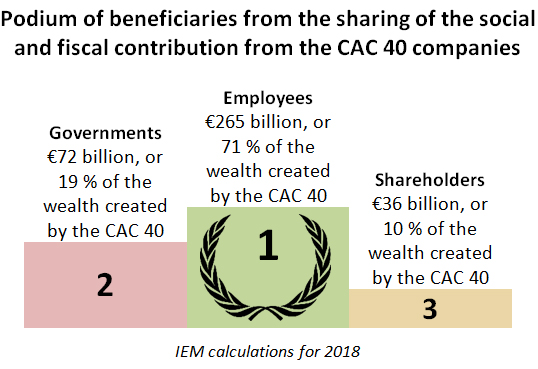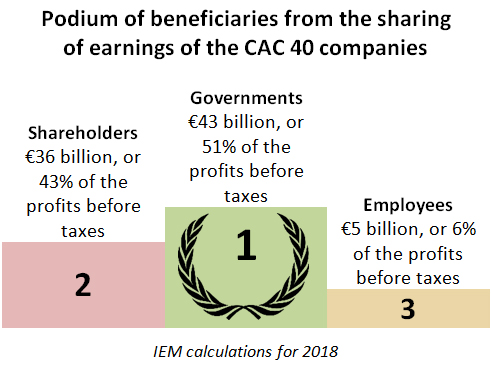The CAC’s fiscal and social contribution was up 10% to €373 billion. Governments and employees were the top winners
Paris, May 14, 2019 – The Institut économique Molinari has released a new study on the social and fiscal contribution of the CAC 40 companies. It presents a new way of quantifying the wealth created by these companies, outlining the sharing of this wealth between employees, governments and shareholders.
It shows that the CAC 40 companies created €373 billion in wealth for the French and global community in 2018. Employees are the greatest beneficiaries, with €265 billion in wealth, followed by French and foreign governments (€72 billion) and shareholders (€36 billion).
In comparison to the previous edition, covering 2016, the CAC’s fiscal and social contribution was up 10% to €373 billion. Governments were the top winners (+14%), followed by employees (+10%) and shareholders (+2%).
If we focus only on the share of earnings, governments appear to be the top beneficiaries with €43 billion, followed by non-government, non-employee shareholders (€35 billion) and then by employees (€6 billion).
EMPLOYEES ARE THE PRIMARY BENEFICIARIES OF THE SHARING OF WEALTH CREATION BY FRANCE’S CAC 40 COMPANIES
The study shows that the CAC 40 companies created €373 billion in wealth for the French and global community in 2018. This €373 billion was shared between employees (71%), the French and foreign governments (19%) and shareholders (10%).

Employees are the top beneficiaries of this wealth creation, with €260 billion in staff expenditures (wages, bonuses, compulsory and optional social protection, etc.), €4 billion in employee savings and share ownership and €1 billion in dividends.
Governments are the second greatest beneficiaries, with €29 billion in taxes on production, €33 billion in corporate income taxes and €10 billion in taxes on dividends.
Shareholders follow behind employees and governments. They are the third-ranking beneficiaries, with €36 billion in dividends (net of taxes and dividends paid to employees). Far from grabbing most of the profits, they take part in a collective wealth creation chain accounting for €373 billion in France and abroad.
GOVERNMENTS AND EMPLOYEES ARE THE TOP WINNERS FROM ECONOMIC DYNAMICS
In comparison to the previous edition, covering 2016, the CAC’s fiscal and social contribution was up 10% to €373 billion.
Governments were the top winners (+14%), followed by employees (+10%) and shareholders (+2%).
This dynamic results from much faster growth in corporate tax revenues (+20%) and personnel costs (+11%), while dividends net of corporate tax stagnated.

STATES ARE THE FIRST BENEFICIARIES OF THE SHARE OF EARNINGS
If we focus only on the profits before taxes, governments appear to be the top beneficiaries, followed by non-government, non-employee shareholders and then by employees.

Government are the greatest beneficiaries of the sharing of earnings, with €43 billion: €33 billion in taxes on earnings, €10 billion in taxes on dividends.
Shareholders are the second greatest beneficiaries from the sharing of earnings, with €36 billion in dividends after deduction of taxes and dividends paid to employees and governments.
Employees are the third greatest beneficiaries from the sharing of earnings, with €5 billion: €4 billion in group savings and share ownership and €1 billion in net dividends.
THE FRENCH GOVERNMENT COMES OUT WELL AHEAD
The French government stands out among the governments benefiting from the development of CAC 40 companies.
On the one hand, it pulls in revenues from production taxes that are double the European Union average. These taxes, levied even before companies turn a profit, account for 3.2% of GDP in France, compared to an average of 1.6% in the EU and 0.4% of GDP in Germany. Though little known to the general public, they are a tax revenue source double the size of the corporate tax, at €72 billion, compared to €36 billion, net of tax credits.
In addition, it benefits from a substantial corporate tax. The ceiling rate is 33.33%, to which should be added the 3.3% social contribution on profits. This produces a maximum tax rate of 34.43%, the highest among the 35 OECD countries. This rate is set to come down to 25% in 2022, or 25.83% taking account of the social contribution on profits, moving closer to the OECD average.
Finally, the French government benefits from taxes on dividends distributed to natural and legal persons holding shares in CAC 40 companies, with a tax that remains high despite the adjustments that have occurred with the creation of the Prélèvement forfaitaire unique (PFU), or single flat-rate levy.
A BASIC ECONOMIC APPROACH
This study provides original numbers on the sharing of the wealth created by the CAC 40 companies and on the sharing of earnings.
The social and fiscal contribution from large companies in France and worldwide remains largely unrecognised. Traditional accounting and financial presentations do not provide for externalisation of the creation of value for the broader community. Devised to present corporate earnings, they focus on financial data and understate the benefits for the French and global community while overstating shareholders’ income by presenting dividends before taxes.
This study aims to remedy this. It identifies and quantifies the gains for employees, governments and shareholders with a sound, robust and well documented. It aims at showing orders of magnitude allowing for a true debate on the creation and sharing of the wealth created by businesses.
QUOTES
Cécile Philippe, President of the Institut économique Molinari and co-author
“The IEM study shows that businesses play a part in a collective wealth creation chain that benefits employees first and foremost, with €265 billion in 2018, then governments with €72 billion and finally shareholders with €36 billion.”
“Focusing on profits alone is not sufficient to grasp the scope of companies’ social and fiscal contribution. The bias that sometimes leads to shareholders being presented as enemies of employees has the flaw of obscuring an inescapable reality: employees, governments and shareholders all have an interest in the development of companies and in their earnings.”
Nicolas Marques, Director of the Institut économique Molinari and co-author
“These original numbers from the Institut économique Molinari show how the big companies benefit employees and governments above all and shareholders to a lesser extent.”
“In 2018, they distributed nine times more wealth to employees and governments as to the owners of capital. Even with a focus on profits alone, shareholders end up behind governments.”
“These orders of magnitude should take the heat out of the debate on large companies and the sharing of their value creation.”
ABOUT IEM
The report is written by Cécile Philippe and Nicolas Marques of the Institut économique Molinari (IEM).
The Association Institut économique Molinari has as its purpose to create greater understanding of economic phenomena and challenges and to make them more accessible to the general public. Accordingly, it conducts scientific research, organizes think tanks, produces publications and provides training and varied forms of teaching toward this end to the broadest possible audience.
THE REPORT IS AVAILABLE IN FRENCH
FOR INFORMATION OR INTERVIEWS, CONTACT THE AUTHORS
• Cécile Philippe, President Institut économique Molinari (Paris, French or English),
cecile@institutmolinari.org, +33 6 78 86 98 58
• Nicolas Marques, Director Institut économique Molinari (Paris, French),
nicolas@institutmolinari.org, +33 6 64 94 80 61




